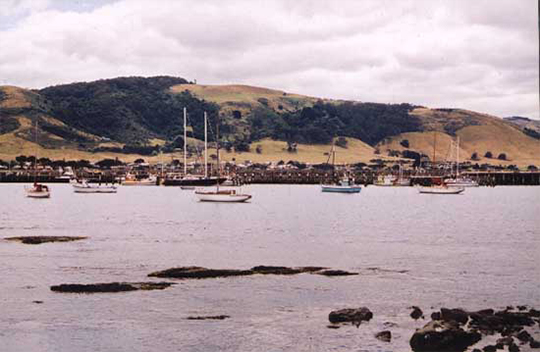Studio 5/01
Powering Apollo Bay Through Art and Science
Ray Green

Studio Description
This studio is concerned with developing design proposals for a site in the coastal town of Apollo, which is located three hours’ drive west of Melbourne on the Great Ocean Road. The brief for this studio is to incorporate in the landscape a variety of land art proposals, and supporting structures, that can generate alternative energy, for example, through solar, wind and other types of clean energy-generating technology. The idea is that the energy generated will be used to power any program elements that require energy to operate. While the generation of alternative energy will be the primary focus, consideration of water, materials, waste, the site’s ecology, and the community will also be required to make the site overall more environmentally, socially and economically sustainable.
The site for this studio is located along the foreshore of Apollo Bay in an area with a nine-hole golf course, harbour, foreshore dunes, beaches, and a breakwater jetty. The Braham River borders the site to the west. The harbour also supports a vibrant commercial fishing industry.
Apollo Bay was established in the mid-1800s with an economy based initially on whaling and timber harvesting. Few historical buildings remain, partially due to a devastating bushfire that ripped through the town in 1857. While fishing is still a viable economic activity for the town, tourism is vital to the local economy and large numbers of tourists and temporary residents visit the town during certain times, particularly during the summer months. More tourism-related development is seen as one way of sustaining this “growth area” town’s future growth.
Studio Outcomes
The three assignments are focused on first undertaking an in-depth site analysis, followed by the preparation of a masterplan and finally developing detailed designs for two areas within the master plan. Design proposals will need to strive to make the site as environmentally, socially, and economically sustainable as possible, taking into consideration the site’s high ecological, aesthetic and cultural values. Design proposals will need to be based on an in-depth analysis of the site, which will entail a fieldtrip to the site. The masterplans will need to incorporate various facilities and activities that can support the land art installations while emphasizing the site’s significant natural, scenic and cultural qualities. Over the course of the semester, students will be involved in weekly design exercises and provided information related to the notion of sustainability, including how water and waste might be managed, alternative energy generated, sustainable materials selected, and how both the site’s ecology and the town’s existing community can be integrated into masterplan and design proposals. Concepts related to alternative energy technology and land art will also be explored throughout the semester.
Studio Leader
Professor Ray Green is a landscape architect, researcher, and author. He started his career in the visual fine arts before switching to landscape architecture and obtaining a Bachelor of Science, Master of Landscape Architecture and PhD degrees in landscape architecture. He is the author of the book Coastal Towns in Transition: Local Perceptions of Landscape Change (2010) and co-authored Planning Housing and Infrastructure for Smart Villages (2019); Towards Low Carbon Cities in China: Urban Form and Greenhouse Gas Emissions (2015); The Green City: Sustainable Homes, Sustainable Suburbs (2005) and Design for Change (1985). He has undertaken extensive research in communities along the Great Ocean Road, including Apollo Bay. Ray spent 12 years in professional landscape architectural practice before taking up teaching and is credited with numerous projects in the United States, Mexico, various Southeast Asian countries and Australia, many of which were located on coastal sites. In 2012 he was made a Fellow of the American Society of Landscape Architects in recognition of his accomplishments in the field.
Schedule:
Tuesday 5:15pm-8:15pm & Thursdays 6:15pm-9:15pm
Off-campus Activities:
Apollo Bay site visit